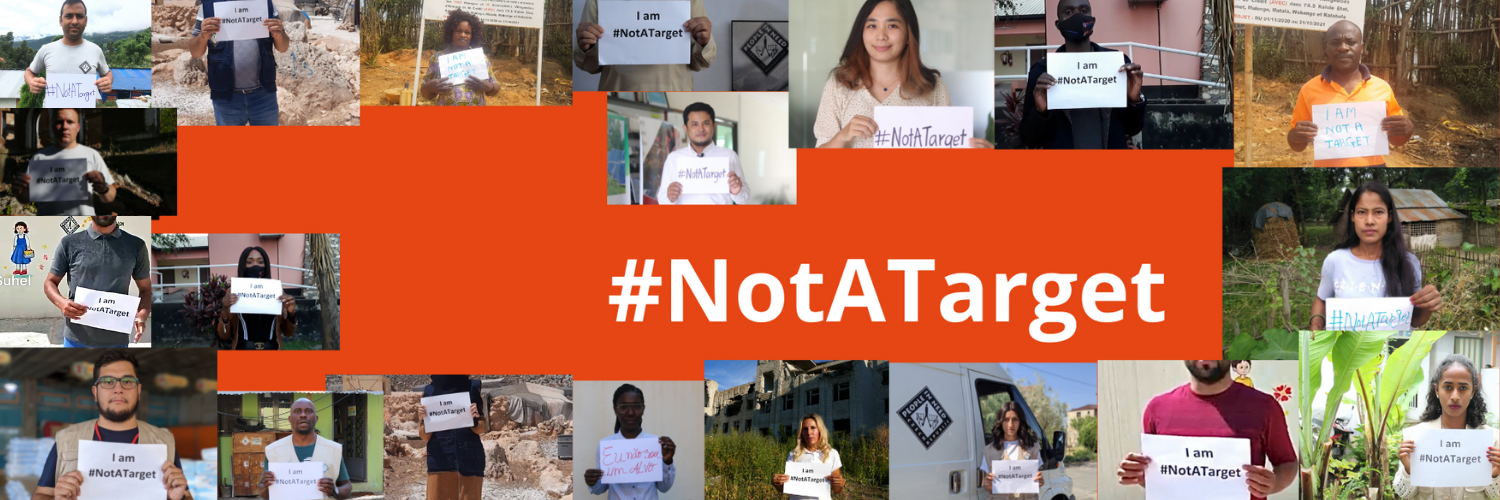I am #NotATarget: Working as an aid worker has never been more dangerous
Published: Aug 19, 2021 Reading time: 5 minutes Share: Share an articleEvery year on World Humanitarian Day, People in Need (PIN) commemorates our fallen colleagues and honours humanitarian workers everywhere who risk their lives to provide aid to people impacted by conflicts, natural disasters, or the effects of climate change. Working as an aid worker has never been more dangerous. Of the recorded incidents last year, 95% of the victims were local staff members.

Data from the Aid Worker Security database show that humanitarian workers are increasingly vulnerable. 2019 was the worst year on record for aid worker casualties - 481 aid workers were attacked. Some 42% of those killed were health workers. Last year was nearly as dangerous, with 108 killed, 242 injured, and 125 kidnapped. In total, 475 workers around the world were attacked in 2020 in 276 separate incidents.
“The statistics confirm that, once again, most victims of major attacks are national aid workers,” said Lauriane Gauny, Deputy Director of PIN’s Relief and Development Department. “It is therefore incumbent on aid organisations to do all that they can to protect these vital, and vulnerable, staff members.”
Syria recorded the most attacks in 2019, while South Sudan, the Democratic Republic of Congo (DRC), Afghanistan, Central African Republic, and Mali were also among the most dangerous countries for aid workers in 2019 and 2020. People in Need operates in most of these countries.
Since 2012, six of PIN’s Syrian colleagues have been killed on the job. In June 2015, PIN suffered the greatest tragedy in our history, when nine Afghan colleagues were killed in an attack. “Everywhere we work, our commitment to vulnerable communities remains strong,” Gauny says, “but our commitment to staff security is always the number one priority.”
“We are constantly strengthening already strict security protocols, investing in preventive measures, and trainings to minimize the risks for our colleagues," Gauny explains.
As a testament to their selflessness, PIN’s local colleagues remain committed to helping their fellow citizens, despite the risks. Mohammad, a PIN aid worker in Afghanistan, says the most challenging issue and obstacle for humanitarian workers in his country is the ongoing conflict and insecurity. Nobody dares to predict what will happen after the Taliban takes power in the country. If at least a little possible, Mohammad will try to continue to help people who suffer from Covid 19, food shortages, clean water and the effects of climate change.
In 2020, 95% of humanitarian aid victims were local colleagues
Of the recorded incidents last year, 95% of the victims were local staff members. This troubling trend could be the result of COVID-19-related travel restrictions, which made it increasingly difficult for international staff to move freely. This trend only underscores the importance of national colleagues. Without them, organizations like PIN could not operate.
People in Need provides humanitarian and development aid in more than 20 countries around the world. “Of the 1,672 women and men providing our relief and development assistance last year, just 140 were expatriates,” Gauny says. “In all contexts, local employees are truly essential.”
In many cases, PIN’s national staff members are living the crises they are responding to. "My work brought me closer to the people and their suffering, especially the widows and those who have no source of income,” says Om Ruba, a PIN aid worker in Syria. "It made me more affected by the situation of people and more determined to help them."
"Being in the field and seeing people on the road waiting for assistance and seeing the happiness in their faces really motivates me. I remember when I was in this situation, and I can feel how happy they are to get assistance and to know that they have not been forgotten during their time of need,” says Ivan, PIN Iraq’s Livelihood Project Coordinator.
Opportunistic violent crimes on the rise
The targeting of humanitarian aid workers continues to accelerate. Already in 2021, aid workers globally have suffered 104 major attacks. "We are seeing a rise in attacks against aid workers in the Tigray region of Ethiopia, as well as in Afghanistan, who are being targeted as the Taliban moves to recapture territory amid the US troop withdraw," says Gauny.
According to the Aid Worker Security Database, aid worker shootings rose dramatically in 2020, and attacks occurring outside original active conflict areas indicated a growing lawlessness and opportunistic violence. PIN’s local colleagues see other challenges, too. Shalik Ram Ghimire, a PIN staff member in Nepal, has responded to earthquakes, floods, landslides, and COVID-19. "Since we work mostly in rural hilly mountains, we have to travel on foot to reach people in remote villages where there is no road access. During the monsoon season, commuting is difficult. Sometimes we must cross active landslides, which can be risky and dangerous."
“One of the hardest things of being a humanitarian worker is the fact that you have to give 110% of yourself every day, but it is also the most rewarding,” says Shirag Krouzian, a field assistant who helps people displaced by the conflict in Nagorno-Karabakh. “When you see people suffering with reduced or no access to basic necessities, you have to go beyond your abilities to alleviate their suffering.”
On World Humanitarian Day, we honour our colleagues Shurag, Shalik, Ivan, Om, and Mohammad, and everyone else who risks their life to help others. And we remember those who paid the ultimate sacrifice in this most noble of professions.
